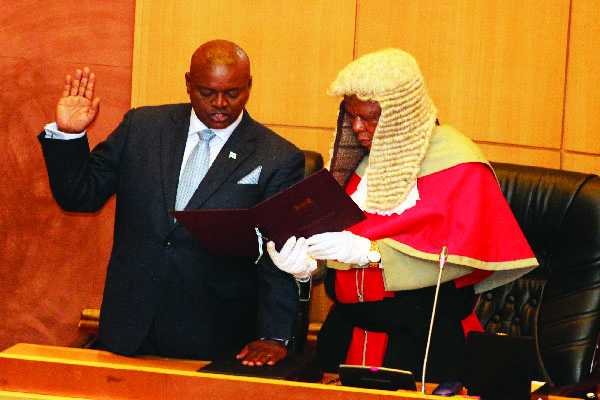Masisi’s powers under spotlight
BCP challenges President’s powers in court
Masisi’s presidency is unconstitutional - Rantao
Botswana Congress Party (BCP) is expected to approach the High Court on urgency to challenge President Mokgweetsi Masisi’s powers regarding appointment of Vice President and dissolution of Parliament.
The BCP this week wrote a letter to Speaker of National Assembly Gladys Kokorwe challenging Masisi’s powers to appoint a vice president as they believe that section 35 (1) under which he ascended to the presidency does not give him overriding powers to appoint a vice president. The party threatened to approach the courts if the Speaker fails to act on their demands.
By Wednesday evening Kokorwe had not yet responded to the BCP letter.
Dumelang Saleshando, president of the BCP, told Botswana Guardian that the speaker has until end of Thursday (yesterday) to have executed her duty of convening the National Assembly to elect the President. “If she fails to do that then we would proceed with the litigation,” said Saleshando. Kokorwe could not be reached for comment. This publication is however informed that the speaker has been advised not to make such an undertaking and wait for the litigation.
The letter was copied to the Attorney General Advocate Abraham Keetshabe and titled, ‘Election of the President of the Republic of Botswana’ under Section 35 (4) as read with Section 35 (5) of the Constitution of Botswana.
The BCP through its lawyers Dingake Law Partners states in the letter that its clients BCP (the party), MP for Ramotswa Samuel Rantuana and MP for Selibe Phikwe West Dithapelo Keorapetse opine that there are four (4) types of Presidents envisaged under the Constitution, and these are; Section 32 President; Section 35 (1) President; Section 35 (2) President; and Section 35 (4) President.
The law firm indicated that as provided for by the Constitution, only Section 32 and Section 35 (4) Presidents are substantive holders of office with the power to make appointments (revoke the appointment of Vice President) or dissolve Parliament.
Section 32 states; Election of President after dissolution of Parliament. Sub section (1) Whenever Parliament is dissolved an election shall be held to the office of President in such manner as is prescribed by this section and, subject thereto, by or under an Act of Parliament. Sub section (2) Nominations in the election of a President shall be delivered to the returning officer on such day and at such time as may be prescribed by or under any law for the time being in force in Botswana; the nomination of a candidate in an election of a President shall not be valid unless it is supported, in such manner as may be prescribed by or under an Act of Parliament, by not less than 1000 persons registered as voters for the purpose of elections to the Assembly.
“His Excellency President Mokgweetsi Eric Masisi is neither a Section 32 nor Section 35 (2) President. Further, he did not ascend to the office of President following an election by Parliament. And to this extent, does not qualify as one (President) under Section 35 (4) as read with Section 35 (5) of the Constitution,” the letter states.
BCP argues that therefore President Masisi is, remains and has always been a Section 35 (1) President; and must be treated as such. Section 35 (1) indicates that whenever the President dies, resigns or ceases to hold office, the Vice-President shall assume office as President with effect from the date of the death, resignation or ceasing to be President. The party further argues that the Constitution in terms of Section 35 (3) provides that a Section 35 (1) President “shall not exercise the powers of the President to revoke the appointment of Vice President or dissolve Parliament”.
“Section 35 (4) and (5) provide for a mechanism of transforming a President under Section 35 (1) and Section 35 (2) into a fully-fledged President. Until such a president is fully-fledged their powers are limited to the extend (sic) provided by Section 35 (3) of the Constitution. The process of transforming a Section 35 (1) President shall take place on the seventh (7) day after the office of President becomes vacant, or such earlier day as may be appointed by the speaker as provided for under Section 35 (4) of the Constitution.
“To the extent that you have not convened the National Assembly on such earlier date for election of the President, our clients demand that you give an undertaking to us in writing, no later than the 11th of April 2018 at 09hrs00min that you will convene the National Assembly for purposes of election of the President under Section 35 (4) of the Constitution no later than the 12th April 2018 at 24hrs00mis,” reads the letter from Dingake Law Partners adding that they hold instruction to approach to approach court on an urgent basis if no undertaking is given and within the requested period of time for an appropriate injunction.






